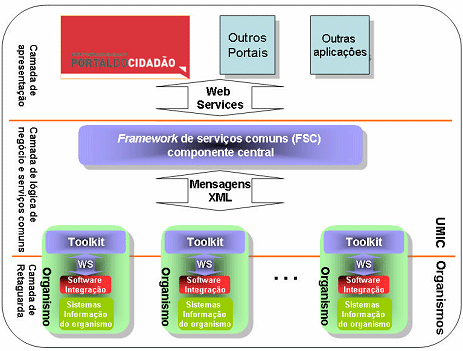

 Public Services
Public Services  Projects
Projects  Interoperability Platform
Interoperability Platform Interoperability Platform
The Interoperability Platform for the Public Administration (AP) is a system which facilitates the multiple operation of different information systems, based on principles of interoperability and security.
 Enables synergies and reduces development needs, since it seeks to integrate the different existing information systems without requiring significant developments in new software or specific hardware reconfigurations.
Enables synergies and reduces development needs, since it seeks to integrate the different existing information systems without requiring significant developments in new software or specific hardware reconfigurations.
At the same time, the platform ensures:
- the electronic accreditation, authentication and authorisation of users with federated identity through tokens (a single Public Administration identity which is verified in each session by any of the several technologies/accreditation specifications (specifically, digital signature certification, user/password and others) and preventing data held in different entities from mixing);
- directing processes and the combination of services and Public Administration information systems (ensuring that the user is provided with an integrated vision of the services provided by the Public Administration);
- integrating the Electronic Payments Platform;
- data privacy, confidentiality and security (ensuring that events are recorded, and monitoring and detecting security occurrences, storage of users and their accreditation, encrypting, storage of permissions, time synchronisation, and secure transmission).
This platform was set up by the Knowledge Society Agency (UMIC) which has also managed its development and functioning. It was foreseen that it would be made available in the second half of 2006. It will be used to increase the services offered by the Citizen's Portal and the Enterprise's Portal, specifically those services which involve identification of identity using the Citizen's Card.
The communication of the Interoperability Platform (also known as the Common Services Framework) with the services of different entities is carried out through appropriate toolkits which enable the data model adopted by the Interoperability Platform and expressed in XML to be related to the specific data model of the entity in question so as to enable communication to take place through the web services of the entity (see the reference architecture in the accompanying figure).
Each toolkit will have two versions, one which can be installed locally in the entity and another installed on the system supporting the Interoperability Platform itself for those entities for which this would be more appropriate given the resources they have available. New toolkits may be developed and added to the Interoperability Platform in so far as they are shown to be necessary for new services or information systems of the entities.
The Interoperability Platform uses open standards, such as XML – eXtensible Markup Language, http, SOAP WSDL, WS-Security – Web Services Security, WS-Addressing, WS-reliable messaging, has adopted open source in the versions of Java and .Net used in the toolkits, and was made available with an open source licence.
This Interoperability Platform was set up by the Knowledge Society Agency (UMIC) which has also managed its development and functioning. It was made available within the framework of the launch of the Citizen's Card on 14 February 2007. This platform will be used to increase the services offered by the Citizen's Portal and the Enterprise's Portal and specifically those services which involve identification of identity using the Citizen's Card.
Responsibility for the running and ongoing expansion of the Interoperability Platform was moved from the Knowledge Society Agency (UMIC) to the Agency for Administrative Modernisation - AMA (site in Portuguese), on 1 May 2007,once this body had been formally constituted following the publication of the organic law and the statutes in the Official Gazette Diário da República, on the 27 and 30 April 2007, to be responsible for the electronic public administration projects which had been started at UMIC , with continuity ensured by the transfer of the member of the Knowledge Society Agency (UMIC) Management Board responsible for electronic public administration projects to become the Director of AMA (site in Portuguese) .
However, for reasons of a practical nature, UMIC continued to ensure the operational aspects involving the finalising and expansion of the development of the Interoperability Platform project until the end of 2007.
